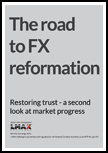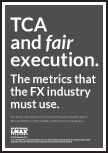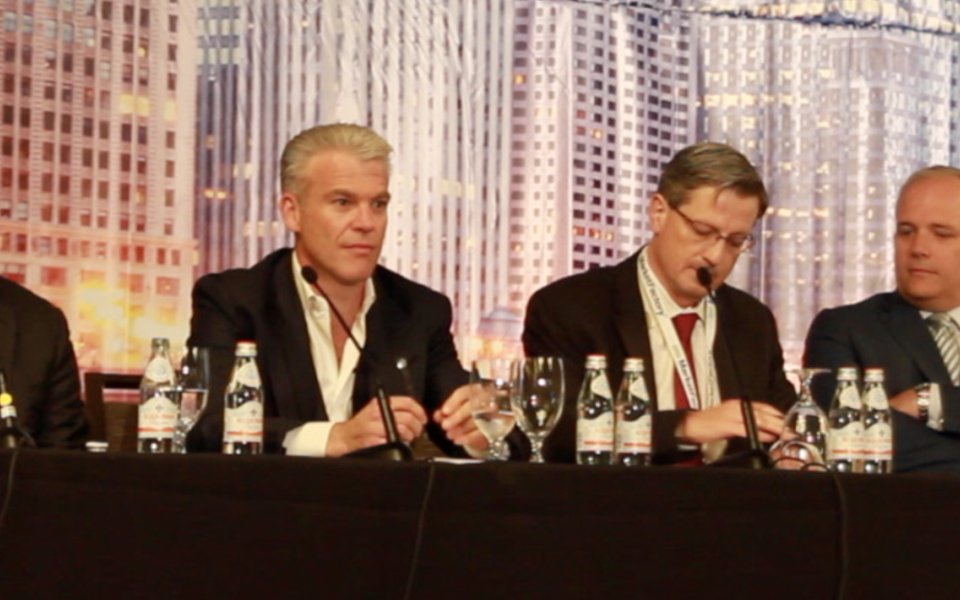Is the environment shifting irrevocably in the FX market? It’s undeniable that the climate of the FX markets is changing, but what do these changes mean for FX liquidity? Watch David Mercer, LMAX Exchange CEO, discuss the effects of FX ‘Climate Change’ in global FX Markets.
Q.1: From your perspective, what key market structure changes have taken place in the last 2 years?
In the last 2 years there has been absolutely no structural change, that’s the reality.
I think as a market we need to get on with it, there’s a lot of working groups going on right now. There’s a lot of talking and working groups being put together, but they’re not actually effecting change.
It needs to change, the market needs to start with it.
We recently did a survey, 85% of the respondents of 500 institutional participants said there needs to be greater transparency. On the flipside, 35% of banks said that ‘last look’ should be abolished. 60% said there needs to be a global code of conduct.
So, right there is the issue. The market believes that we need to be more transparent, the market agrees there needs to be change but doesn’t quite agree on how. If the market doesn’t get together and decide how to implement it and continue to be self-regulating, the regulators are going to propose rules that won’t work in FX.
So, I think it’s down to us to get on with it and to effect change.
Q.2: There’s been a global FX code of conduct for years it didn’t do anything? How will a new code of conduct affect the market now?
We need to get right to the crux of the issues that are open to abuse.
It means, you talk about liquidity, you talk about the lack of liquidity, you talk about phantom liquidity – a lot of that comes through this anathema which is ‘last look’ on multi-dealer platforms.
Now, I’m not talking about single dealer platforms, banks or non-banks that have relationships with their customers. How that customer chooses to be executed, how they’re dealing with the single dealer, is up to that bi-lateral relationship.
But, you talk about liquidity disappearing, a lot of that is because you have effectively, one price feed, one quote, that is the ‘re-vended’ 50 times around the market place, guess what, there’s not 50 bucks of liquidity when the initial quote was 1 buck, and that’s why you’re seeing it disappear.
So, let’s get to the crux, if you want a code of conduct, it’s not about being nice chaps and making sure we’re always fair with our customer – it’s about ridding the market, of the areas that are open to abuse, because someone in the marketplace will abuse it.
Everyone I speak to doesn’t abuse this technology solution to a business problem – but someone does abuse it, and it doesn’t happen in other asset classes, so that for one, is something, which we should get on with.
The second point, which is quite remarkable and came from the FEMR study is ‘time stamping’.
Really, honestly and truly in 2015, are you telling me it is that difficult for any dealer, any dealing platform, to timestamp an order from the moment it’s received, to the moment it’s executed, to the moment it’s received back by the customer
So a global code of conduct, about how we behave, is fine – but let’s get to these principle issues, let’s make the change ourselves, and then perhaps the regulators will allow us to regulate ourselves and operate an efficient market.
And operate a sound, smart, vibrant market that the commissioner has just spoken about.
Q.3: You think ‘last look’ is the cause of ‘phantom’ liquidity. Without ‘last look’ won’t a lot of platforms end up with no liquidity whatsoever?
I would say that if you look at the platforms around here, along with a couple of firm limit order exchanges, we have unique liquidity.
We don’t just ‘re-vend’ liquidity, we don’t just aggregate liquidity. Let’s discover what real liquidity is in the market place.
There is a lot of liquidity out there and it’s good for the customer, there’s probably never been a better time to be a customer, with your choices of various methods of execution.
But the reality is, there should be a cost for it, and I think the liquidity right now is too cheap. Put simply, if you want greater transparency, you’re going to have to pay for it.
And, to your point if someone has a large order to go through, if they choose to execute on a plethora of venues, they’re giving up that right to anonymity, they’re giving up the right for the market not to see that information. If they choose to go for what they think is best execution, by hitting 10, 20, 30 venues, that’s gone, if they choose to do it bilaterally with 2 or 3 named LP’s, that’s absolutely fine, I think that can continue. But if you start to hit the NDPs then you give up that right.
Liquidity has been damaged this year, and there’s no doubt if you went to all firm limit orders, there’d be less liquidity out there. But, it’s supply and demand, it finds its right level, and it should be the right price for liquidity and the right price for those risk-takers, who provide liquidity 24 hours a day, 5.5 days a week.
Q.4: It seems banks stop pricing to a lot of venues anytime there’s a  market ‘dislocation’ event like the SNB. Is this a serious problem?
Let’s not just say banks, banks and non-banks, a lot of liquidity providers pull out over numbers.
But, I’d say the best liquidity providers on the street, DON’T pull out over numbers. In fact, that’s normally their axe. You guys all know who’s number 1, 2 and 3, and their axe is, that they price over a number because it’s a ‘random walk’.
The SNB was a market dislocation, which none of us have ever seen – it was a pegged currency.
I’ve been in some silly meetings this year where people ask what if it happens in EUR/USD? And they’ve also said to me what happens if J.P Morgan goes bust?
I said if J.P Morgan goes bust and EUR/USD loses 20% then we’ve all got bigger issues. So let’s not look at these skittish moves you’re seeing in a thin market at the moment, and say it’s going to be like the SNB again – it isn’t!
I think the best LPs will price over a number, but again, there’s a price for that. I like a lot of LPs out here, are tired of retail brokers saying, ‘oh my god you went wide over number’, you were a whole 3 points wide! Come on guys, pay the price, you’re lucky we weren’t a big figure wide!
Q.5: Is the real liquidity problem we will face in the future, actually going to be in forwards and swaps?
I would have thought so. There are other asset classes that have struggled, probably more than FX, to put that on e-platforms or exchanges.
Look at fixed income. It’s taken a hell of a long time for it to get there. So I think the longer out you go, the harder it’s going to be, and they are OTC products.
People want uneven shapes – but I think at the short end the curve, out to one month, I think there’s going to be plenty of liquidity there and they can certainly be traded exchange style.
Q.6: Do you think that in 2 years’ time you’ll be even more positive about the global FX market structure?
I think I have to be. Because after 4 years it sounds like everyone else is coming in our direction!
We’ve been banging on about a level playing field, open access and transparency for four years, so it’s nice to see the marketplace moving in that direction…





